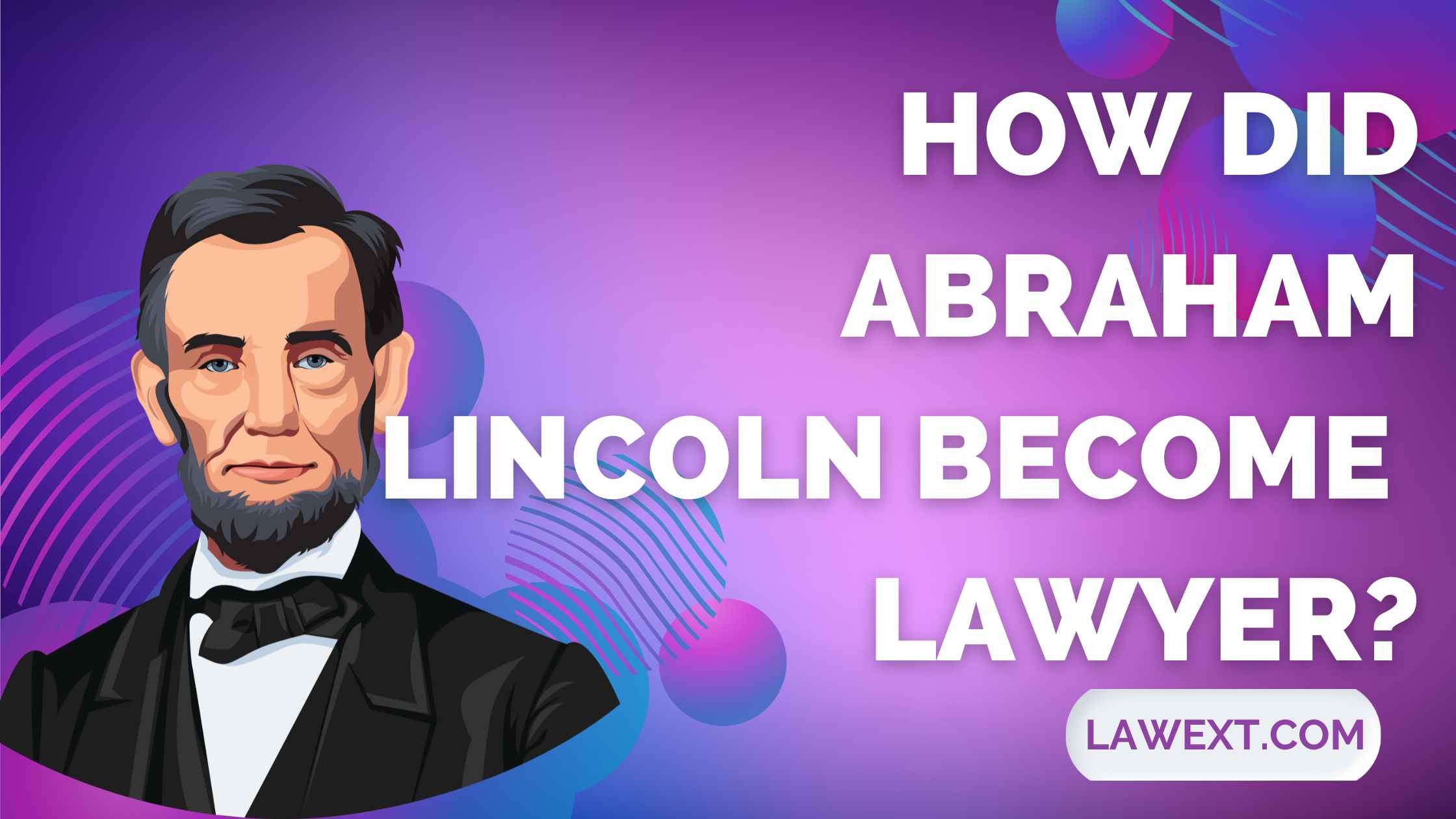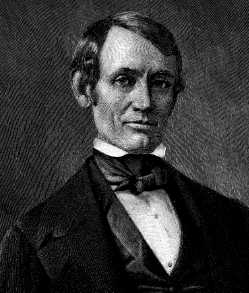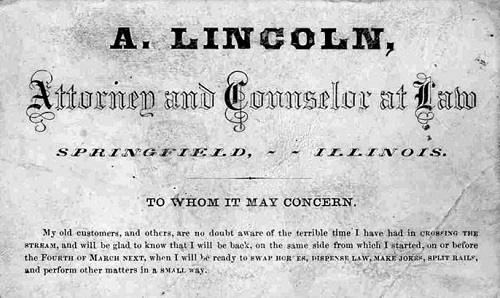How Did Abraham Lincoln Become a Lawyer?

Abraham Lincoln became a lawyer through self-study, as he lacked formal education. He was admitted to the Illinois bar in 1836.
Table of Contents
Embarking upon the journey of law without the access to higher education, Abraham Lincoln exemplifies self-made success. His legal career began in New Salem, Illinois, where his voracious reading and analytical skills enabled him to master the complexities of law.
How Did Abraham Lincoln Become a Lawyer? His dedication to understanding legal principles, combined with his work ethic and intelligence, facilitated his rise in the legal community. By passing the bar exam, he secured his place in the ranks of respected practitioners, laying the foundation for his future political career. Within the legal fraternity, Lincoln’s journey serves as an inspiring tale of perseverance and intellectual self-reliance. His contribution to the legal profession continues to be celebrated, underlining the significance of determination in achieving one’s ambitions.
Early Life And Education
Abraham Lincoln’s journey to becoming a lawyer is a tale of determination and self-directed learning. His early life set a foundation for the immense intellectual growth that would define his legal career.
Childhood And Formative Years
Born into a modest family on February 12, 1809, Abraham Lincoln faced challenges from the start. His early years were marked by frontiersman’s labor and limited schooling. Despite these obstacles, Lincoln’s appetite for knowledge was clear. His formal education, by today’s standards, was meager, adding up to less than a year. Yet, this did not deter young Lincoln.
- Born in a one-room log cabin in Kentucky.
- Schooling totaled less than 12 months.
- Family moved several times, eventually settling in Illinois.
The limited access to education in his rural communities meant Lincoln learned to value each opportunity to read and write. Borrowing books from neighbors, he read whenever he could, educating himself through sheer will and determination.
Self-education And Intellectual Pursuits
Without the benefit of formal schooling, Lincoln turned to self-education to satisfy his intellectual curiosity. His love for reading was unmatched, and it became his doorway to knowledge. Eager to learn about a variety of subjects, Lincoln would often be found absorbed in books after long days of work.
- Extensively read law books available to him.
- Studied mathematics to sharpen his mind.
- Practiced writing and public speaking.
- Analyzed newspapers to understand political affairs.
He mastered legal principles primarily through self-study. Lincoln’s lack of consistent and formal education is a testament to his remarkable ability to learn. He examined legal documents and observed courtroom proceedings whenever he could, learning from real-life legal exchanges. This commitment to self-education led him to become one of the most respected lawyers of his time, long before he would emerge as an iconic American president.
Abraham Lincoln’s early life and education tell a story of perseverance. His path from a one-room cabin to the highest echelons of the legal profession is an inspiration to many.

Entrance Into Law
The journey of Abraham Lincoln into law is a tale of dedication and self-discipline, beginning with his early career moves and culminating in a period of fervent self-study. This period in his life illuminated the way for Lincoln to leave an indelible mark on the American legal and political landscape.
Early Career Moves
Abraham Lincoln embarked on his career through a variety of jobs. Each experience contributed to his legal aspirations. Lincoln worked as a shopkeeper, a surveyor, and even an axeman. His interactions with people from all walks of life shaped his understanding of societal issues.
- Shopkeeper: Gained customer service skills and understood trade laws.
- Surveyor: Learned about land disputes and property rights.
- Axeman: Developed a reputation for integrity and hard work.
Self-study And Legal Preparation
No law school was necessary for Lincoln. He poured over law books, dedicating himself to learn the craft. Lincoln believed in the power of reading and self-education to become a lawyer.
He read law books borrowed from local attorneys and established a routine. His discipline turned pages of dense legal texts into deep-rooted knowledge. Lincoln’s unique path towards law showcased his resolve and intellectual capabilities.
In 1836, after years of study, Lincoln obtained his law license. His self-study and relentless pursuit of knowledge fashioned him into an adept lawyer, ready to handle the challenges of the courtroom.

Legal Mentorship
Legal mentorship played a pivotal role in Abraham Lincoln’s journey to becoming a lawyer. Without formal education in law, it was common during the 1800s for aspiring lawyers to study under established attorneys. This practice allowed Lincoln to gain the knowledge and expertise needed to navigate the complex legal landscape of his time.
Influence Of John T. Stuart
John T. Stuart, a renowned lawyer and politician, saw potential in young Lincoln. He recognized Lincoln’s sharp intellect and capacity for understanding legal concepts. Stuart offered him access to his extensive library, where Lincoln could study legal volumes for hours. This guidance laid the foundation for Lincoln’s legal comprehension and skills.
Through Stuart’s mentorship, Lincoln learned the craft of law firsthand. Stuart provided insight into the methodology of legal proceedings and the strategies used in the courtroom. Their collaboration allowed Lincoln to witness practical applications of the law in real-world scenarios.
Joining Stuart’s Law Practice
After years of dedicated self-study and guidance under Stuart, Lincoln reached a pivotal moment in his career. Joining Stuart’s law practice marked the start of Lincoln’s professional legal journey. With this partnership, Lincoln managed actual cases and responsibilities that honed his advocacy skills.
At Stuart’s firm, Lincoln took on various legal issues that ranged from property disputes to criminal defense. By working on these cases, he developed a reputation as a diligent and capable lawyer. This experience was instrumental in Lincoln’s eventual success as a lawyer and later, as the President.

Credit: www.abrahamlincolnonline.org
Building A Practice
In the mid-1800s, Abraham Lincoln embarked on a legal career that would become as notable as his political rise. Building a practice in law wasn’t simple in Illinois. Yet, Lincoln’s commitment and unique approach paved his path to becoming a respected attorney.
First Cases And Legal Reputation
Lincoln’s legal journey began humbly. His first cases were not glamorous. They often involved petty disputes or debt issues. Over time, his caseload expanded in size and significance. Lincoln worked diligently, taking on a variety of cases. This diversity helped him grasp the nuances of legal practice.
His reputation grew as a man of integrity and competence. Clients trusted him because he worked hard for their interests.
- Managed varied cases with diligence
- Built trust through honesty
- Quickly adapted to legal challenges
Lincoln’s Approach To Law And Advocacy
Lincoln’s approach to law was unique. He believed in a simple, clear, and logical argument style. He avoided confusing legal jargon. This made his cases more understandable to judges and juries alike.
As an advocate, Lincoln was persuasive and personable. He knew the law well. But he also understood the power of storytelling. His closing arguments were often decisive, swaying the opinion of the court toward his client’s favor.
Key aspects of his approach included:
- Clear and logical arguments
- Use of storytelling in advocacy
- Focused on the persuasive power of simplicity
Impact On Law And Politics
Abraham Lincoln’s journey to becoming a lawyer profoundly affected both law and politics. As a self-taught legal mind, Lincoln navigated complex legal landscapes before his presidency. His legal career shaped the foundations of his political ideologies, which later transformed America.
Notable Cases And Legal Achievements
- Hurd v. Rock Island Bridge Company (1857): Defended a railroad company, influencing transportation laws.
- Illinois Central Railroad v. County of McLean (1853): Helped establish principle of federal property taxation.
- Legal reformer: Advocated for evidence-based verdicts, reshaping trial procedures.
Transition From Law To National Politics
His legal expertise seamlessly transitioned into a political narrative that captivated a nation on the brink of division. Lincoln’s debate skills and ethical standpoints in the courtroom became the bedrock of his political strategy.
| Year | Position |
|---|---|
| 1834-1842 | Illinois State Legislature |
| 1847-1849 | U.S. House of Representatives |
| 1861-1865 | 16th President of the United States |
The skills honed in the courtroom led to landmark decisions and speeches during his presidency. These include the Emancipation Proclamation and the Gettysburg Address, further entwining his legal acumen with his political legacy.

Credit: rogerjnorton.com
Lincoln’s Legal Legacy
Abraham Lincoln, the 16th President of the United States, left a significant mark not only on politics but on the field of law as well. A self-taught lawyer, Lincoln paved his way through legal practice with sheer determination and an acute understanding of the legal system. His legacy in law continues to impact how attorneys practice and interpret the law even today.
Innovations In Legal Thought
Lincoln’s approach to law was innovative and pragmatic. He transformed complex legal language into plain, understandable English, making the law accessible to all. His skill in breaking down legal barriers helped lay the groundwork for a more inclusive understanding of the law. These changes initiated by Lincoln brought forth practices that modern lawyers still use:
- Empathy: Understanding the human element in legal cases.
- Storytelling: Using narratives to clarify legal points.
- Simplicity: Simplifying legal jargon for wider comprehension.
Lasting Influence On American Jurisprudence
Lincoln’s impact resonates within the core of American legal principles. His dedication to justice and equality shaped the role of legal professionals in society. Several key contributions include:
- Emphasis on Ethics: Underlining the importance of ethical conduct.
- Equality under Law: Promoting the notion that all are equal before the law.
- Legal Precedence: Setting precedents that uphold fundamental human rights.
Lincoln’s work fortified the pillars of American law, paving the way for fairness and impartiality in the justice system.

Credit: www.abraham-lincoln-history.org
Conclusion
Abraham Lincoln’s journey to becoming a lawyer was a testament to his self-education and determination. His path exemplifies the power of perseverance, even without formal schooling. Embrace your own challenges with Lincoln’s unwavering spirit in mind. So, take inspiration from his story and chase your ambitions with equal tenacity.
Amelia Justiceberg, a distinguished legal luminary, thrives on the intersection of empathy and legal acumen. As a prominent family law attorney, she orchestrates compassionate resolutions amidst complex dynamics. Justiceberg's courtroom finesse and dedication to fairness define her practice. Beyond litigation, she ardently advocates for social justice, solidifying her reputation as an influential force in the legal landscape.






